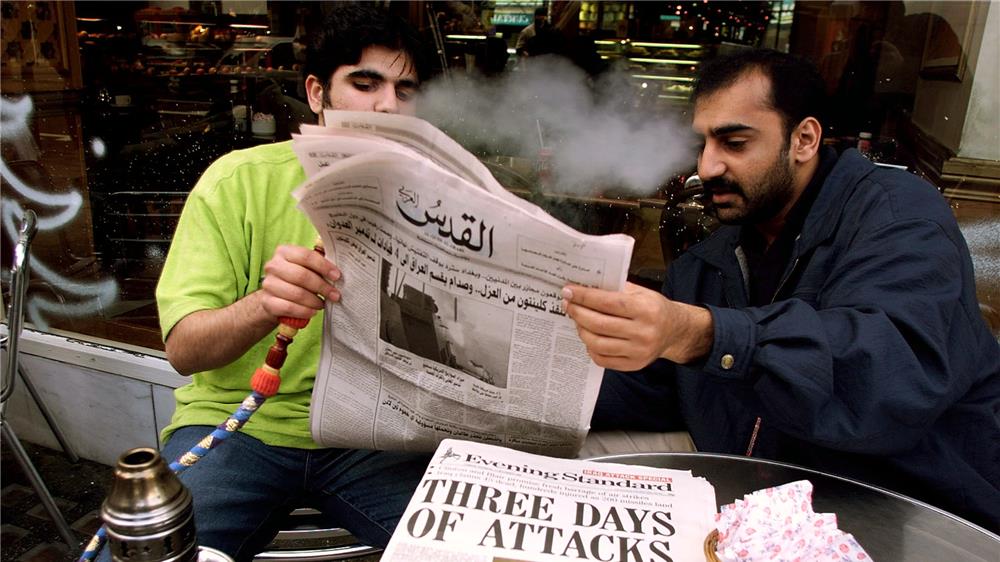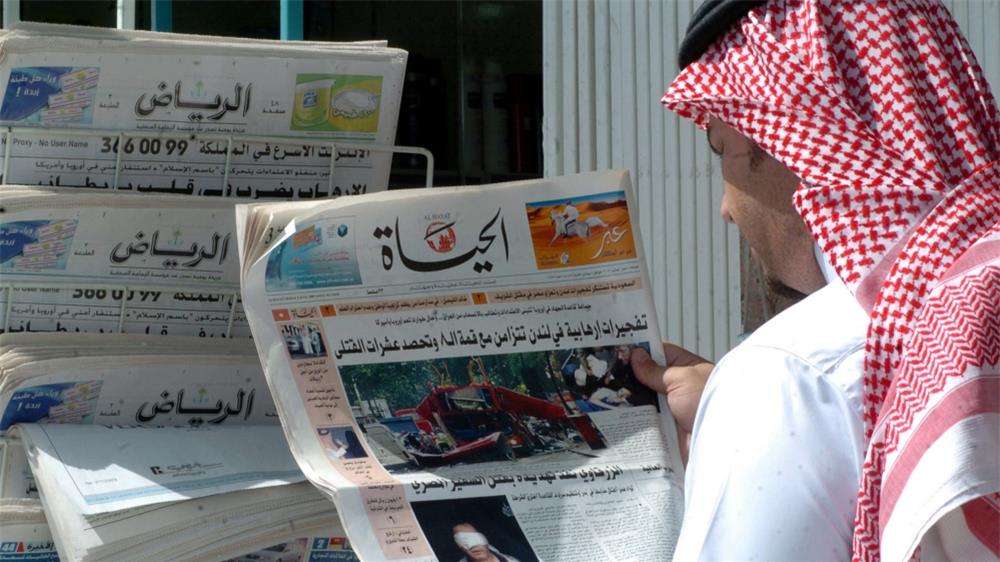أثار الإعلان عن توقف الطبعة الورقية من جريدة "الحياة" اللندنية مؤخرا كثيراً من ذكريات وشجون مع شعور بالفقد! فقد شيء عزيز تنتهي بغيابه مرحلة بالنسبة لكثيرين، أنا أوّلهم.. مرحلة شكّلت فيها الجريدة الورقية جزءا هاما من يومهم ورابطا معنويا لا غنى عنه مع الوطن إن لم يكن مع الأوطان.. أقصد العربية تحديدا.
في الغربة، العلاقة مع الجريدة الورقية العربية لها معنى آخر، هي ركن من أركان اليوم، طقس من طقوس الصباح، ولقاء مع "هناك"! مع كل هذه الصحف اليومية المنتشرة حولي باللغة الفرنسية، كانت عيناي لا تبحثان إلا عن هذه الحروف العربية في المكتبات، كانت تختبئ في ركن صغير خطّ في أعلاه "صحافة دولية". كنت أذهب خصيصا لشرائها، لا أرغب في الاشتراك بها، وكان في اقتنائها شيءٌ من المغامرة. سأتوجّه من بلدتي الصغيرة إلى المدينة الكبيرة، سأدخل المكتبة الواسعة وأتوجه فورا نحو مكانها دون أن أعنى بكل ما حولي من أغلفة مغرية وعناوين مهمة بالفرنسية، كانت هي هدفي الأول والوحيد، قد أجدها وقد لا يحصل وستنتابني الفرحة أو الخيبة.. كان هذا جزءا من المتعة، أبحث بين عدة صحف وأختار مجلة "الوسط" اللندنية وجريدة "الحياة" في حال وجودهما، أشتريهما فورا دون تقليبهما، أخطفهما وأخرج بهما بفرحة فيها شيء من طفولية، وأظلُّ أقرأ فيهما لأيام عدة، فالجريدة اليومية كانت غنية متنوعة بمواضيعها لدرجة لا تترك معها صفحة أو مقالة. لم يكن توزيع الصحف العربية بفرنسا منتظما، أما ما كان منتظما بالنسبة لي فهو استلامي شهريا عبر البريد -وهذا في كل البلدان التي أقمت بها وهي عديدة- ظرفا كبيرا سميكا يحتوي قصاصات من بعض الصحف اللبنانية، لا سيما جريدة "السفير"، كانت أمي تعدها لي بعناية بعد أن توصي صاحب المكتبة في الحارة بأن يحجز لها عددا من "السفير"، خاصة طبعة الجمعة التي كانت تنفذ بسرعة البرق في سوريا بفضل ملحقها الثقافي.
في بداية الألفين ولمدة عقد من الزمن، كانت الصحف والمجلات العربية تباع في معظم المدن الفرنسية، وبات هناك خيار معقول أمام القارئ المهتم للاطلاع على توجهات أخرى حتى لو كان يجد فيما هو معتاد على قراءته تعددا في وجهات النظر. أيضا، بدأ آنذاك قادم جديد مخيف يفرض نفسه بقوة وسرعة لينتزع الصدارة!
كان اختفاء مجلة "الوسط" حينها مقدمة لاختفاءات أخرى.. اختفاء أولي من الأكشاك الباريسية ثم من الوجود بالكامل! "السفير" عام 2016 أولا، ثم "الحياة" في العام الحالي 2018. في يومٍ لم تكن "الحياة" هناك، لم تعد تتصدر الأكشاك التي بات الركن العربي فيها أكثر تواضعا.. كنت لا أكفُّ عن السؤال عنها أينما توجهت في مختلف الدوائر الباريسية العشرين، ذلك لظني أنه أمر يتعلق فقط بالتوزيع في فرنسا وليس بالجريدة. لكن الأمر الأكثر إثارة للريبة كان اختفاؤها أيضا من المطارات ومن الطائرات التي كانت توزعها، إلى أن انتشر الخبر يوما وعلمت أنهم توقفوا رسميا عن توزيعها في فرنسا، ثم زاد الأمر سوءا حين قيل لي إنهم قرروا التوقف عن طباعتها!
إن كانت أسباب اختفاء الوسط فالسفير فالحياة -وهي غيض من فيض الاختفاءات- مختلفة، فالجانب الاقتصادي مشترك للثلاثة، وإن لم يكن ظهور الإنترنت سبب توقف "الوسط" عام 2000، فربما شكل جزءا بسيطا من أسباب الاختفاء الكامل "للسفير" وسببا إضافيا لاختفاء الطبعة الورقية من جريدة "الحياة".

مع اعتيادي الكامل على استخدام الشبكة العنكبوتية والهاتف الذكي، ظلّت الجريدة الورقية ودون أدنى تردد هي ما أفضّلُ للقراءة، أطلبها في الطائرات ومن أصدقاء كانوا يأتون من لبنان. صحيح أني اعتدت على استخدام الإنترنت ولكن كمن يعتاد على شيء ينفر منه إنما هو مفروض عليه. أحبّ الإمساك بالجريدة، تقليب صفحاتها وتصفحها جيدا في البداية قبل اختيار ما يلائم مزاج الصباح المتغير يوميا، أميل إلى الشرود بين حين وآخر وأنا أقرؤها قبل أن أعاود التركيز من جديد.. أحبُّ هذه العلاقة معها وجها لوجه، هذه القراءة المتأنية حيث لا يوجد عشرات الروابط التي تحتل مساحة رؤيتي وتدعوني للضغط عليها، هذه الصحبة الصباحية لنفس الجريدة لأيام متتالية حتى لو كانت يومية، فكم من فائدة في قراءة الأخبار البائتة، ورصد ردود أفعال كانت حماسية على فعل انتهى بل ونسي!
منذ فترة قصيرة غابت الحياة، وغابت معها متعة قراءة الصحيفة الورقية.
بعيدا عن العواطف
لكن، إذا نظرنا عمليا وليس عاطفيا إلى اختفاء الطبعة الورقية لجريدة "الحياة" اللندنية في غرة يونيو/حزيران وأدرجناه ضمن سياق أوسع يشمل العلاقة مع الصحافة اليومية المطبوعة -والذي هو صميم الموضوع- فإننا سنتفهم الموضوع على نحو أفضل، وإن لم نقبله!.. ندرك أن الهدف من الجريدة اليومية المطبوعة إعطاء أخبار يومية، إذ في اليوم التالي لصدورها، تغدو تلك صحيفة قديمة لأن التتابع السريع للأخبار يقتضي -بل يفرض- أن يطّلع كل إنسان بشكل مختصر على ما يحصل، وبالتالي لا بد لتساؤل أن يُطرح حول أهمية طبع معلومات "سطحية" و"وقتية" عفا عليها الزمن بسرعة؟!

طبيعة الأخبار تفرض الاطلاع العاجل عليها مما يجعل الصحيفة اليومية المطبوعة وسيلة إعلامية أقل ملاءمة بكثير من الإنترنت. مع هذا، وفي هذا الصراع بين الصحافة اليومية المطبوعة والإنترنت، فإن الأولى كانت لوقت قليل مضى تمتلك ميزتين: الأولى حين لم يكن الإنترنت متوفرا بهذه السرعة التي هو عليها اليوم، ولا في أماكن كالمطار والقطار والمقهى حيث كان للجريدة مكانها.. ميزة انتهت مع الهاتف الذكي. وتكمن الثانية في أن قراءة نصوص طويلة على الإنترنت ليست ممتعة.. إنما قد يكون هذا أمرا نسبيا، فمن جهة يأتي التعود شيئا فشيئا، ومن جهة أخرى إن اعتمدت المطبوعة مقالات معمقة وطويلة (مثل "الحياة") تُقرأ على مدى أيام عدة وربما أسابيع بعد صدورها لتميزها عن الإنترنت، فإنها بهذا تعتمد على مواضيع أو أدوات ليست تماما في أساس مهنة "اليومي"، أي الخبر اليومي تحديدا. وفي وضع تنافسي شديد سواء أكان في حالة الصحافة أو أي مجال آخر، على المؤسسة في العموم أن تركز على اختصاصها الحقيقي وهو هنا "اليومي".
في الإنترنت أيضا تختص بعض المواقع في فرنسا والبلاد العربية بنشر مقالات يومية قصيرة، بينما تعتمد أخرى مقالات ذات حياة أطول، ويختار القارئ الموقع حسب ذوقه أو حسب اللحظة. وباتت المؤسسة الصحفية التي تعتمد هذين النوعين من المقالات معا غير جذابة للجمهور العريض! إذ إن محبي النصوص القصيرة سيتوجهون نحو الصحف المتخصصة بالأخبار المختصرة، وهواة النص الطويل العميق سيتركونها نحو المنافس المهتم بالنصوص والتحليلات. والنتيجة هي أنه لم يعد هناك اليوم إلا قراء متقدمون في السن للصحافة المطبوعة التي تكتفي بالأخبار المختصرة، أما الصحافة المطبوعة التي تحاول الحفاظ على التميز بإعطاء مقالات معمقة فلم يعد من مبرر لوجودها!
هكذا يبدو بوضوح كبير أن لا مستقبل للصحافة اليومية المطبوعة، على عكس الأسبوعية والشهرية التي تحافظ على حيوية ما، لكونها تضع نفسها في زمن أبطأ من الإنترنت. سنفترض إذاً أن هذه المعركة بين اليومي المطبوع واليومي الرقمي قد انتهت عمليا، وثمة معركة أخرى تدور اليوم ولا تبدو نتائجها واضحة بعد.. إنها من جهة، بين وسائل إعلامية ضخمة تحولت إلى الإنترنت، ومن جهة أخرى بين المدونات والمواقع. هنا تحتدّ المنافسة ولم تعد بين يومي مطبوع أو يومي على الشبكة، ولكن بين يوميتين على الإنترنت! وعلى الخصمين في هذه المعركة إبراز الكفاءة.
وبينما تتمتع المدونة بالحرية وتهتم بما تهمله الصحف الكبرى ويمكن لها اتخاذ أسلوب مثير للجدال يجعلها جذابة لجمهور يميل إلى الحدة في الطرح بعيدا عن اللغة الدبلوماسية، أو الخشبية كما يطلق عليها في فرنسا، التي تنتهجها الصحف الكبرى، فإن المؤسسة الإعلامية الكبرى -"الحياة" على سبيل المثال- لديها سمعتها الجيّدة وقدرتها المالية التي تسمح لها بالاحتفاظ بكبار الصحفيين وبأعداد أكثر للبحث عن الخبر وتناول مواضيع شديدة التنوع، مقارنة بالمدونة التي تعتمد على فريق عمل صغير جدا وغير محترف بالكامل، يقدّم الأخبار ويعلّق عليها ولكن لا يأتي بها، كما يركّز على مواضيع محددة. وفي فرنسا مثلا يصعب على مدونة أن تتعامل مع الرياضة ومع الأخبار السياسية الدولية معا.
بين الورقي والشبكة.. مخاطر
مع انتشار القراءة على الشبكة العنكبوتية وبالأخص على الهاتف الذكي (الذي يصيب بالغباء!)، لن نهمل الاتهامات الكثيرة، ومن أهمها أنها قراءة سطحية تبعد القارئ أكثر فأكثر عن القراءة الحقيقية.
في مقالة مترجمة نشرتها جريدة الرياض يوم 8 مايو/أيار 2018 وقعتُ عليها بالصدفة (بفضل الإنترنت)، تقول الكاتبة آني مورفي بول حول قراءة الأدب بأن "القراءة العميقة -وهي النقيض للقراءة السطحية التي غالباً ما نقوم بها على الإنترنت- مُهددة بالانقراض، لذا علينا أن نتخذ خطوات للحفاظ عليها إذا كُنَّا نريد أن نبني التاريخ أو نقوم بأعمالٍ فنّية كبيرة"، لأن اختفاء هذه القراءة المعمقة "سيُعَرِّض النمو العقلي والعاطفي للأجيال التي نشأت على الإنترنت للخطر".
وعلى ما أوردته الكاتبة بالاعتماد على أبحاث ودراسات نشرت في كندا وبريطانيا في السنوات الأخيرة، فإن هناك "أدلة مُتعاظمة تُشير إلى أنَّ القراءة عبر الإنترنت رُبما تكون أقل ارتباطاً وأقل رضاءً حتى بالنسبة «للمواطنين الرقميين» الذين يألفونها بشكلٍ كبير، وهذا خطأ"، ولهذا فإننا نحتاج أكثر إلى أن "نُريهم بعض الأماكن التي لم يذهبوا إليها أبداً، مكاناً لا يمكن أن يذهبوا إليه إلا بالقراءة العميقة".







































